Narrelle M. Harris's Blog, page 9
August 16, 2020
Lockdown Fiction: Stand LIke Stone
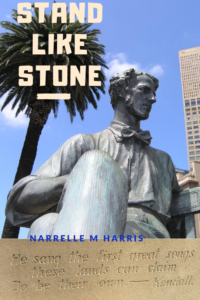
This week’s prompt from Improbable Press made me think of Australian poet, Adam Lindsay Gordon, and how I’ve often wished there had been somebody to rescue him.
Gordon’s poems are generally much more glum than his most famous few lines suggest, but I’m glad he’s known best for the hope than the despair.
Stand Like Stone
Cal knew it wasn’t done to climb statues, but he did it anyway, there in the middle of a Melbourne night. The metal was cold – colder than the night itself – but Cal was so cold already it hardly mattered.
Being held, or at least holding someone, that’s what mattered. Months of alone, months barred from touch. Months in an inverted world.
His chest ached and his breath wheezed on the ascent, but he made it.
Some joker had attached a mask to the statue’s face. Adam Lindsay Gordon, bush poet, his noble features concealed behind the message: breath was dangerous, lately. Cover up, protect yourself, protect others.
Gordon’s statue depicted him sitting loosely in a chair, the accoutrements of his riding days underneath the chair, a pen in one hand, a book in the other, his index finger marking a page. On the verge of writing another poem.
Poetry had been the death of him. The printing debts, and the acquired brain injury of one fall too many from the saddle.
Cal sat in Adam Lindsay Gordon’s lap and leaned his head against the metal folds of his shirt. Cal was still cold on the outside, but he felt warmer inside, and he recited his favourite of Gordon’s lines.
Life is mainly froth and bubble
Two things stand like stone
Kindness in another’s trouble
Courage in your own.
Clumsily, Cal removed Adam’s mask and fixed it on his own face. It was a kindness in others’ trouble; it was courage in his own. Homeless, hungry, haunted. But he could do this. Protect others. Protect himself.
‘You all right up there, son?’
Cal, cradled in metal arms, looked down towards the face looking up at him. A man in a puffy coat, a beanie pulled over his ears. A big fellow, with broad shoulders and big arms. Masked. Maybe like a bandit; or like a superhero. Hard to tell which these days.
Cal coughed behind the mask, a nasty, chesty cough.
‘Do you have a home to go to?’
Cal shook his head and coughed again, a terrible fit of it that left him exhausted. He leaned against Adam Lindsay Gordon’s solid torso and closed his eyes.
‘How about we get you somewhere warm?’
Cal was surprised the man was still there. Coughing fits were a sure way to clear a bench, a room, a whole fucking side street these days.
‘I’m sick,’ Cal said.
‘I’ve already had it,’ said the big man. ‘You shouldn’t be out here in the cold.’
‘Nobody wants me,’ said Cal, and wheezed again. ‘I’m not safe.’
The big man didn’t ask why, so Cal didn’t have to tell him about the shouting at home, the hitting, being trapped indoors with a father who hated the difference in his son, who was mainly only different to him. There were loads of people just like Cal, really, out in the world. There was nothing wrong with him, really, except, of course, for the obvious.
‘Come on. Let me take you somewhere warm.’
Cal peered over Adam Lindsay Gordon’s arms to the big man. His eyes had adjusted to the gloom and dear god, the man was huge. Like a bear. Like a statue come to life. His eyes seemed kind, but Cal had been fooled by kind eyes before.
On the other hand, here he was, sitting in the arms of a statue, waiting to die of cold and loneliness. Might as well take a punt. Courage, Adam Lindsay Gordon urged. Maybe the bear man would be kind.
Cal tried to climb down again, but a coughing fit seized him. The mask protected the Bear Man but made it harder for Cal to catch his breath.
But then the Bear Man climbed up the statue too, and helped Cal. Arms around that thick neck, across those broad shoulders. Bear Man was warm, the heat soaking into Cal’s chest and belly and it made him want to cry.
‘Hold tight. Here we go.’
The bandit/superhero reached the ground again and scooped Cal into his arms.
‘You’ll be safe with me, I promise,’ he said to Cal, walking across the park to the blocks of flats on the opposite side of the park. ‘We’ll get you fed and warm and work out if I should take you to hospital.’
Cal should have had an opinion, but all he felt was safe as this stranger took him home and wrapped him in a doona and gave him soup and pillows and paracetamol and care.
Then there was sleep, deep and long, and fourteen days in isolation, during which Cal learned he had a chest infection but not a virus, that some people really were as kind as they looked, and that the hero-bandit’s name was Adam.
Of course, Cal thought, smiling. Of course the strongest, safest arms he knew belonged to Adam.
August 11, 2020
Quintette of Questions: Dawn Meredith
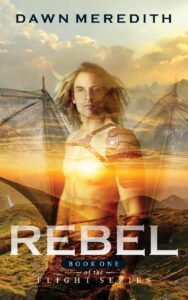
Today I ask Dawn Meredith five questions about her new book!
1. What’s the name of your latest book – and how hard was it to pick a title?
My book is called Rebel and is the first in the Flight trilogy. Titles are my nemesis really. It takes ages to find the right one and even then I am never reeeeeeally sure if it’s the best I can do. I tend to pester my family and friends for ideas. I favour one-word titles as I think they are easier to remember, but encapsulating a 100,000 word novel in one word? Almost impossible!
The book was originally called Flight, but my publisher asked me for a trilogy, so I had to come up with three new titles! They are: book 1 – Rebel; book 2 – Runaway; and book 3 – Renegade.
2. If you could choose anyone from any time period, who would you cast as the leads in your latest book?
To play Reeve: a really young Chris Hemsworth is what I imagined. To play Sye: a really young Catherine Zeta Jones. To play Zeth: again, really young Zac Efron (but with brown eyes and long hair).
3. What five words best describe your story?
Power, betrayal, friendship, love, humour
4. Who is your favourite fictional team/couple?
Kevin Levin and Gwen Tennyson from Ben10 Alien Force. They argue but there’s also a lot of humour and they can’t help being attracted to each other. They save each other’s lives a lot.
5. What song reflects a theme, character, relationship or scene in your book?
I listened to a lot of Two Steps from Hell music while writing this book, especially for the battle scenes. Heart of Courage, Winterspell, Blackheart, After the Fall, Birth of a Hero, Secret Melody and many more. The music is written for screenplays, so its easy to imagine the scenes while listening!
About Rebel
A young rebel is called upon to lead… with a broken wing and absolutely no idea what he is doing.
A wounded flying hero struggling to accept his destiny, a shy girl of dark, mysterious secrets unaware of the power within her and a lonely youth out to prove himself worthy of his warrior father.
A race with dragon DNA suffer under malevolent overlords, dreaming of a hero to set them free. But what they get is a handsome young joker more interested in breaking the rules than breaking free his people.
Buy Rebel
Shooting Star PressSmashwordsRebel (Flight Book 1)[image error] (Amazon US)
About Dawn Meredith

Dawn grew up in England, Australia and Norway. She has always been a book worm, annoying her family while growing up and now as a mum, she has passed on that habit to her daughter. Dawn is the published author of 11 other books for children/young adults and one adult novel.
Her first books were published in 2000. She prefers adventure stories but has written non-fiction as well. Writing a high fantasy novel for teens has been a long term goal. She has written 5 other novels in the fantasy/science fiction genre.
Dawn moved with her family to a 100 acre farm in North West Tasmania in 2018. Here she has a gorgeous little studio facing valleys and mountains and where her cat Harry ‘helps’ her work. She is also an artist, singer and songwriter. Dawn adores gardening and enjoys creating colourful places to sit and admire the native birds and bees. She is keen to try archery and blacksmithing, has a Fine Arts degree & speaks fluent Norwegian.
Social Media
WebsiteBlogFacebookInstagram: @mytasmaniangarden
August 5, 2020
Lockdown Fiction: The Only Daughter of Time
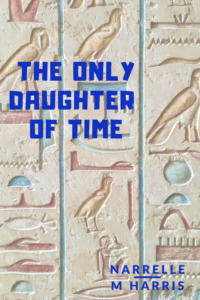
Here we are again, with a story prompted by the Improbable Press blog. It seems my mind lately is rather fixated on metamorphis.
The Only Daughter of Time
The sun blazed hot outside but within the colonnade the air was cool and fresh. Outside smelled of hot dust; inside of earthy stone and antiquity. Ruins, partially reconstructed for the delight of the tourists, made them all feel small in the scheme of time, large in their self-estimation. They had lived to see these sights, and had the gumption to travel far to places where habits, beliefs, language, all different.
Excited travel chatter faded and the group stood in the cool stone cocoon and gazed up, up, up at the paint that clung, centuries later, to the ceiling. Ochre reds and pale greens, the hint of yellow and, in one large, stubborn patch, a blue ground from lapis lazuli made a faux sky on the stone that blocked the real sky.
Ameenah sneezed into the silence, mucus membranes agitated beyond endurance by the colour blue. The floral origin was neither here nor there. Ameenah was allergic to blueberries, blue skies, the blue moon, the Moody Blues. Blue got right in amongst her cells and niggled till she sneezed. Every. Goddamned. Time.
Dr Mason, back home in London, insisted the allergy was psychosomatic. Ameenah insisted that her imagination had never been that vivid, let alone powerful enough to actually manifest sinus pain, irritated nasal passages and actual snot.
Ameenah, sneezing, as remarked, into the silence, and the explosion of it bounced off the marble walls and around the pillars and from the stone floor to carved ceiling and all in all, there was nothing discreet about it.
A tiny flake of blue split away from the ceiling, and another, and a third: drifting down like falling ash.
Sl
ow
ly
do
wn
onto Ameenah’s red-eyed face. A flake into her left eye, a flake onto her lip (and licked unconsciously away) and a flake below her nose so that when the next sneeze began, she inhaled it sharply into her sinus cavity.
Blue. Right there. In the centre of all the trouble.
Ameenah, who was not a believer in crystals, was not aware that lapis lazuli was associated with self-knowledge, with intuition, and with past lives.
Well, not to begin with.
But as she stood on the flagstones, blue in her nose, in her eyes, on her tongue, a much older part of her self turned over. The blue that invaded her body woke up sleeping knowledge and woke up the blue in her blood and the blue of her skin.
The sleeping part of her blinked, took a deep, deep breath and …
Maat, Goddess of Truth, awoke.
Ameenah was not, it turned out, allergic to blue.
Truth had just been waiting for the right blue to rise up.
La verità fu sola figliola del tenpo.
~ Leonardo Da Vinci, from original manuscript “Moto, colpo“
Truth was the only daughter of Time.
August 3, 2020
New Anthology: Oz Is Burning
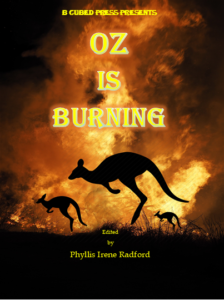
B Cubed Press’s fundraising anthology Oz is Burning has been released, just a little behind its original timing to coincide with the NZ Worldcon!
B Cubed commissioned the stories as a response to the devastating bushfires of February 2020 (how long ago that seems now) and a portion of the proceeds will be going to WIRES.
Australian and New Zealand writers were asked to submit stories of a post-apocalyptic world. My own contribution, Harvest, has a little fire, a little water, a few seeds and a certain amount of mindful weeding. (My Patreon supporters got a sneak peek of the story earlier in the year).
If you read the ToC reveal in April, you’ll see that Oz is Burning contains stories by some of ANZ’s best writers of specfic and horror, including Gillian Polack, Kyla Ward, Lucy Sussex, Jack Dann and Jason Nahrung (who recently won an Aurealis Award for his PhD thesis!)
Oz is Burning – edited by Phyllis Radford – is already available for Kindle and is likely to be on other platforms soon.
Oz is Burning (Amazon US)
Help to support the writers and WIRES by getting a copy!
July 27, 2020
Lockdown Fiction: Chrysalis
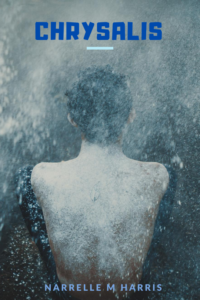
My mind is definitely taking a lot of apocalyptic turns when I write to the Improbable Press prompts – but then I try to make them less grim. I’m not too sure which one this story is.
Pop over to Improbable Press to read what others have done and to try out your own prompted fiction!
Chrysalis
Nobody survives Chrysalis. That is to say, no body does. Everyone who ingests the tricky little amoeba responsible for Chrysalis emerges from it different to what they were before.
It doesn’t affect the other animals, only the primates. Monkeys, apes, and us. Enough of a dose of the little single-celled animals, and our bodies alter. We grow sleepy and sluggish, we grow cold and stiff. We grow little crystals all over our skin.
We hibernate.
Some awful things happened at first, when loved ones and medical professionals tried to remove the crystals, to peel the sleepers within out of the shell. A lot of people bled and died, and the ones that didn’t were horribly scarred and never properly woke up.
When people first found out what was happening, they put all kinds of measures in place to identify where the amoeba was breeding, though maybe breeding isn’t the word. Fluoride in the water wasn’t touching it, so everyone boiled their water or drank it bottled. Then it turned out it was in the bottled stuff, and in soft drink and any manufactured beverage, so ubiquitous that the bottled drinks industry collapsed overnight.
Entamoeba histomorphia, they’re called. Single-celled agents of change.
Most mutagens are cancerous, but not these little creatures. They change everything, but if left to their lifecycle, they don’t’ kill everything. It’s human intervention that does that.
The people who emerge from Chrysalis have slower hearts and stronger muscles. They have tougher bones and softer skin. Their altruistic impulse is more highly developed and their sense of self is more robust. They speak more but shout less; they sing more, do more art, too.
The biologists and behaviourists are still discussing how histomorphosis acts on the brain. They don’t argue about it, except in a purely debate-team sense.
Oddly, aggression hasn’t disappeared entirely. But with our new soft skin and greater sense of community, it’s directed differently. Righteous anger fights for the community, though not for conformity.
Post-Chrysalis people are sort of like the better angels of our nature.
A few conspiracy theorists try to sell the idea that Entamoeba histomorphia were developed in a leftist lab by snowflake hippies. E. histomorphosis resulting in the kind of thing snowflake hippies like, apparently. Others think it evolved from the cell-eating Entamoeba histolytica. Most scientists have concluded it was an accident of circumstance, because of how we’ve changed the climate on the planet, and all chemical soup we pumped into it.
Generally, climate change and poisoning the environment were meant to bring an end to humanity, so I guess it did that, though not in the ways we were expecting. Those little critters coat us and imbue us and change us, and we emerge from Chrysalis a new species.
I have crystals on my throat today, on my cheeks and eyelashes. They are coming in little pretty waves over my shoulders and inner elbow and the soles of my feet.
About time. I drank three litres of unboiled, unfiltered water yesterday, inviting them in. All the best monsters have to be invited in, and all the best monsters are just the heroes of their own stories too, and that’s what we’re truly becoming.
The term Human 2.0 was first bandied about on Twitter, but the Science Side of Tumblr stole a march on that with Pan narrans. They borrowed the name from Terry Pratchett. The story-telling ape.
And now, today, into the future, Pan narrans is telling a new story.
July 15, 2020
Lockdown Fiction: Bone Deep
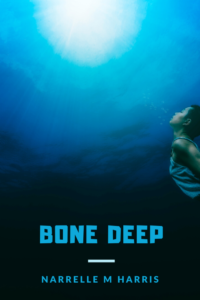
After a sudden run of work, I’ve finally had time to write some more lockdown fiction to the Improbable Press prompt this week!
Bone Deep
The ocean floor is made of bones. The earth’s great rocky bones of quartz, mainly, but others too. The calcium of shells and skeletons, the structures of coral and whales and clams and the great ichthyosaurs.
And soon, too soon, my own, down on the deep ocean floor where light is a blue memory high, high above.
Shapes loom back and forth across the distant glow. The salt water above me is my sky, filled with clouds of fish, the floating zeppelins of cetaceans, the arrows of hunting sharks.
Above that deadly drowning sky swells a whole other ocean of air and clouds, traversed by shoals of birds and the hurtling winged ships of the firmament.
I thought I would miss the blue sky more; that I would long for the stars. But the ocean is full of little living lights, worlds of them, twinkling bright, enticing curious fishlings, curious humans too, into danger.
Leaning against an inky shadow made of stone, wedged underneath it in fact, is my own shell, my carapace, the interlinking hexagons of my undersea habitat. A seaquake had thrown it, slow-motion and roaring with sound for the squids to hear, into a whirlpool and onto the rock, and cracked it like a crab shell.
The science that was my excuse to be here spilled out into the silky beach of ocean bed. I spilled too, in my submariner suit, in my helmet, my oxygen tank on my back. A hermit with my borrowed shell.
The air runs low.
My gaze lifts high. To the soft blue glow of that other world above.
I sent my latest readings and reports. I sent a message to that other world.
A farewell message from this alien world. From this heaven.
I am sad only that I will not be here to be in love with everything I see.
But I am at peace, because I will be part of the place that I love. I will be part of the ocean floor: teeth and skull and the phalanges that held delicate instruments and the spine that curled into warm blankets as I slept blissful in the womb of the world.
July 12, 2020
More poems to get you Through the Day
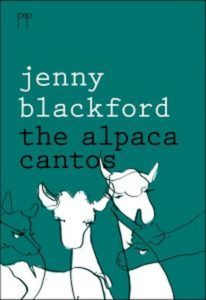
I wrote last week about the pleasure I’ve found in rediscovering poetry through Samuel West’s Pandemic Poems on Soundcloud.
Spurred by those poems, I’ve also been delving into Australian poetry, partly because of the series of Quintette interviews I did early on in the pandemic. Among the books I bought or were sent to me, I have Jenny Blackford’s The Alpaca Cantos Michael Farrell’s Family Trees and Thuy On’s Turbulence.
And these books also reminded me that a while back, Tim bought Omar Sakr’s These Wild Houses for me as well.
I’m not a great scholar of the poetic form, and tend to write lyrics rather than straight poetry myself. At school I adored John Donne until he got religion and I found his poems a bit boring (his cheeky love poems make me laugh) and I’ve always had a soft spot for Phillip Larkin. (I think I must like sass in poetry form).
I’ve also recently come to admire Carol Ann Duffy particularly, and to appreciate the gifts of a wider range of writers. I often encounter poems and words that speak to me, so while not every poem appeals (and while I don’t understand every poem) I do love the sound of them, the rhythm and the dream-like qualities they have.
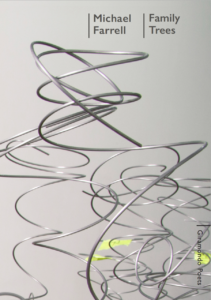
I found Michael Farrell’s poems particularly dream-like in that way, less to be understood than felt, though there’s understanding to be had.
With lines like ‘My name is Bedingfield and I almost exist’ (in “If You Want to Drink Whiskey with the Big Boys You Have to Drink the Whiskey”) and the visuals of ‘”Knitting a Poem by the Hoover Dam”, it’s an intriguing collection.
The Alpaca Cantos are great fun, with many poems about animals – including, but not limited to, alpacas. Slugs, for example, described as ‘the small monster’ and a failed kitty hunter that loses a baby rat, ‘the tiny terrifying wild thing’. The section of “Lamentations”, dealing in part with dementia, touched a chord in me too (or maybe a nerve) with my father’s recent loss. It’s a charming, slim little volume and a lovely introduction to Jenny Blackford’s award-winning poetry.
Two of the poems are here on the Rochford Street Review if you want to hear more.
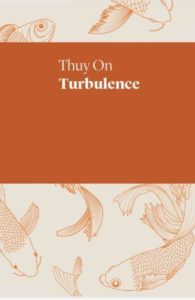
Thuy On’s poems in Turbulence were inspired by big changes in her personal life, and the words are sensual, raging, insightful. Some of it is bitterly funny, and it’s all fantastic. I really responded to so much of its imagery, like ‘Bare-limbed and straight-backed / we braced against the rising vowels’ (“Vertigo”) and I loved the fed-up fury of “To date an Asian woman” and its ‘Not a lotus flower / in fragrant docility / an exotic bloom silk petal’ and later ‘learn my name / I’m not a mass of continents / a chopstick dish’.
A particular favourite is “Carpe Noctem” and all the reasons ‘She wears black…’ which is short and I don’t think I can reproduce here, so you’d best just buy the book.
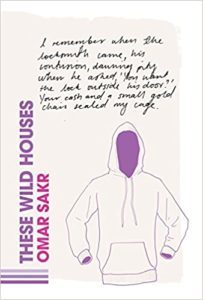
All of these books led me back to These Wild Houses by Omar Sakr, a bi Muslim Australian poet. He examines identity from this perspective, which is fascinating and beautifully told. In “Door Open (Like all habitats, my body tells)” he writes, ‘…Come inside, let me / warm you with all I am. Mind your head / here on the ridges of my teeth. Careful / where you step, I am breakable…’.
“Call Off Duty” opens with the poet addressing someone playing the video game and ends with the poet having sent a coming out letter to that person, fearing the worst, ‘…saying I forgive you / for all that is to come, and hoping / at last for salaam to exist between us…’ The ache of it is soothed at the end with ‘And everything I thought I knew / broke into a sound like prayer’.
StylusLit has a much more comprehensive review. Sakr has since released a new collection called The Lost Arabs.
Support an Aussie poet
Michael Farrell’s Family Trees
Giramondo PublishingReadingsGlee BooksAvid Reader
Thuy On’s Turbulence
UWA Publishing (UWA is currently offering free postage their poetry titles)ReadingsBooktopiaDymocksBookdepository
Jenny Blackford’s The Alpaca Cantos
Pitt Street Poetry
Omar Sakr’s These Wild Horses
Cordite Books
July 9, 2020
Pandemic Poems

When the coronavirus pandemic first sent Melbourne into lockdown, I looked for things to bring me comfort. One of the first things I discovered was actor Samuel West’s Soundcloud which he’d begun, similarly to find comfort. I’ve always been fond of West, since he played Prince Caspian in the 1989 TV adaptation of The Voyage of the Dawntreader. Latterly, I’ve been casting him in my head as my John Watson in some of my Holmesian novels.
As of 9 July, Sam West has posted 351 poems, mostly requested by his followers on Soundcloud and Twitter. He’s delivered a lot of poems by British and American poets, but also sought out those by poets of other nations. Most are read by him but also those read by his parents, Timothy West and Prunella Scales, and by poets and actors, including Lou Brealey from Sherlock, Paterson Joseph, Natalie Dormer, Gemma Whelan.
I’ve heard Donne and Tennyson, Phillip Larkin and Carol Ann Duffy. Henry Lawson. Sylvia Plath. Dorothy Parker and Mary Oliver. I’ve heard lyrics read as poems, poems 50 seconds long and other that for for nearly 15 minutes. I’ve discovered new poets and rediscovered old favourites.
I’ve requested poems (he read a very funny one by PG Wodehouse!) and some of the poems brought me comfort when my father passed away in May.
I don’t know if you’re into poetry at all – I go in and out of it myself, but this channel has rekindled my fondness for the form – but if you’d like some fascinating words read in perfect voices, you can do worse than visit Pandemic Poems to see what if might provide for you.
A few favourites:
Anne Hathaway by Carol Ann Duffy, read by Samuel WestPrinter’s Error by PG Wodehouse, read by Samuel WestThis Be the Verse by Phillip Larkin, read by Beatie EdneyA pandemic jukebox, including The Lion and Albert by Mariott Edgar, read by Samuel West.
July 5, 2020
Quintette of Questions: Fin J Ross
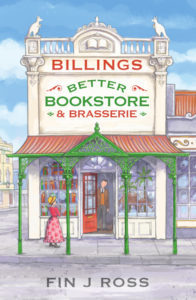
Today I’m asking Fin J Ross 5 questions about her new book!
1. What’s the name of your latest book – and how hard was it to pick a title?
My newly released novel is Billings Better Bookstore and Brasserie. I specifically wanted an alliterative title, so my bookstore name had to start with ‘B’. The title was originally Billings Better Bookstore and Cafeteria, but given that the story features alliterative verses heading each chapter, it was a no-brainer that it should become Brasserie.
2. If you could choose anyone from any time period, who would you cast as the leads in your latest book?
Given that my main character, Fidelia Knight, ages from nine-year-old to 19, that’s a tricky one as casting would necessitate a child actor and a late teenage actor. Mackenzie Thomas (currently appearing in the ABC’s Operation Buffalo) could fit the young Fidelia. Kiera Knightly or Emma Watson as older Fidelia. As for Jasper Godwin, I picture Terence Stamp, Jason Isaacs or Sam Neill.
3. What five words best describe your story?
Inspiring, Uplifting, Historical, Mystery, Logomaniacal
4. Who is your favourite fictional team/couple?
Sherlock Holmes and Dr Watson – absolutely, without question!
5. What song reflects a theme, character, relationship or scene in your book?
I Gotta be Me
About Billings Better Bookstore and Brasserie
Young Fidelia Knight arrives in Melbourne in 1874, alone except for her treasured companion, Samuel Johnson; well, half of him. To escape servitude, Fidelia hides each night in Bourke-street’s renowned Cole’s Book Arcade. She loves words, you see, and wants to know them all.
What she overhears in Cole’s sets her on a path that will change the lives of everyone she meets, starting with Jasper Godwin, the hopelessly underqualified manager of the new Billings Better Bookstore.
Fidelia’s thirst for knowledge is contagious. She tutors two orphan boys and two illiterate women, inspiring them to unlock their creativity; and her exploration of colonial Melbourne takes her to some unusual places.
Nothing daunts this diminutive genius, except the mystery of what really happened to her parents on the voyage from England.
Buy Billings Better Bookstore and Brasserie
Clan Destine PressBooktopia
Billings Better Bookstore & Brasserie[image error] (Amazon US)
About Fin J Ross

Fin is a journalist and creative writing tutor, whose day job is running a boarding cattery in East Gippsland.
She is co-author (with her sister, Lindy Cameron) of the true crime anthologies Killer in the Family and Murder in the Family, and author of the fantasy novel A.K.A. Fudgepuddle.
She is a keen short-story writer and has won eight category prizes in the annual Sisters in Crime Scarlet Stiletto Awards, among other competition wins.
She has written an as yet unpublished crime novel, Switchback Road, and is working on a sequel, Open Season, but has diverted her writing attention to an historical novel about Ludwig Becker, a German artist and scientist; one of the five lesser-known men who also died on the Burke and Wills expedition.
Her love of cats extends to breeding British Shorthairs, and in her spare time, she compiles cryptic crosswords.
Social Media
June 9, 2020
Review: Octavius and the Perfect Governess by Emily Larkin
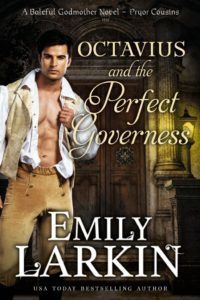
Emily Larkin has released a new book in her wonderful Regency-era Baleful Godmother series, and is taking the series in a new direction after a series of short stories called the Pryor Prequels.
The series began when a woman and her three daughters save a faerie child from drowning. It’s fae mother rewards them with wishes that will follow the family line – as each female descendant reaches a particular birthday, they will be granted a wish. But the Fae are scary folk, and Baletongue will trick them if she can.
Previous books have followed the female descendants, but the Pryor Prequels trace how one descendant transferred her wish to the male line, and the terrible consequences of that wish.
Now, in the first novel following that thread, we have Octavius Pryor, a wealthy young man from a family of men with special, faerie-gifted powers. His grandfather is very strict, however, on the rules of how such gifts can be used, because of what his mother wished.
Octavius in fact has chosen the same wish that Miss Appleby did back in Unmasking Miss Appleby, the book that got me hooked on this series. Like Charlotte Appleby, Octavius has chosen the gift of metamorphosis.
In Unmasking Miss Appleby, Charlotte changes into a man in order to escape her restricted life; here, Octavius first changes shape into a woman as a forfeit on a bet with his brother and cousins, and visits Vauxhall Gardens with them at night. There he discovers just how unpleasant man can be, and how little power women have in his world.
When Octavius adopts a female shape again in order to teach the vile Baron Rumpole a lesson for the attempted assault, he encounters Miss Toogood, the governess Rumpole has engaged to teach his two daughters. He determines at once to find a way into Rumpole’s household in order to protect this courageous, kind woman from the fate that has befallen other women in Rumpole’s household staff.
There follows a novel of Larkin’s usual deft charm, wit and pace. She gives the subject matter the seriousness and drama it deserves, with Octavius learning and absorbing the lessons of how the privilege of been male and wealthy are not extended to others, and how those privileges can be used to abuse others. The characters are nicely drawn, likeable but flawed, and the obstacles to their love are those of circumstance and genuine conflict rather than foolish misunderstandings that could be fixed if people would just talk.
I particularly enjoyed Octavius and his cousin and friend teaching Miss Toogood self defence – this isn’t going to be a story about a damsel in distress, but of two people with agency, learning and becoming stronger together.
The shapeshifting element of Octavius and the Perfect Governess brings an interesting undercurrent, seen also in Unmasking Miss Appleby, of body dysphoria and characters that are not transgender but whose feelings may reflect some experiences of being transgender. This is the element that first engaged me with this series and I enjoyed reading about it from the male-to-female perspective.
I’m looking forward to more books in this series – and there are hints that there may be another gay romance in the set.
You can read an excerpt of the book on Emily Larkin’s website.
Buy Octavius and the Perfect Governess
Octavius and the Perfect Governess[image error] (Amazon US)Nook BookKoboiBooksGoogle PlayBooktopia



